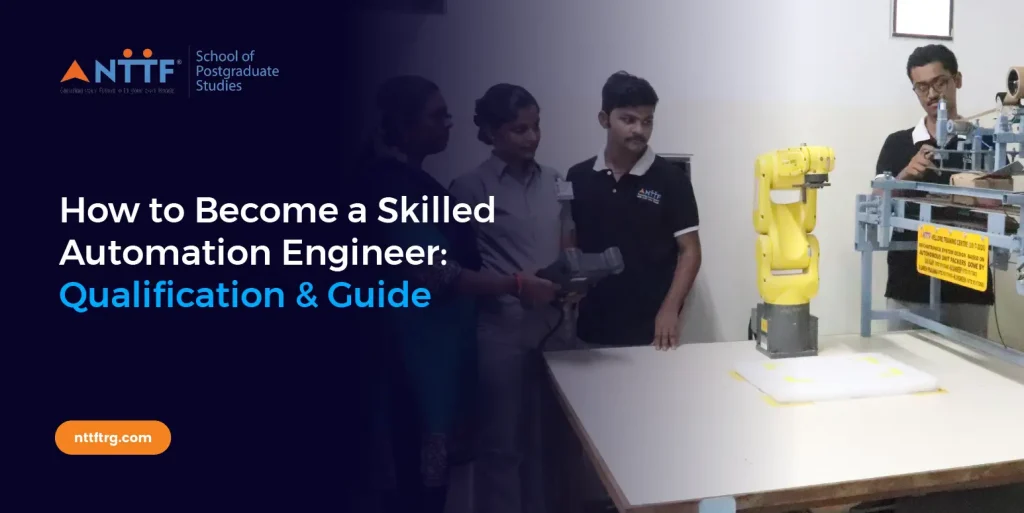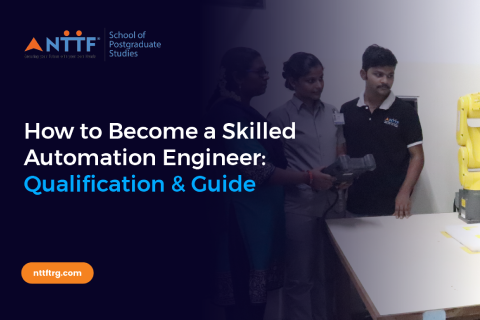How to Become a Skilled Automation Engineer: Qualification & Guide
February 5, 2025 2025-02-05 8:38How to Become a Skilled Automation Engineer: Qualification & Guide

Humans have always dreamt of a world where machines do the heavy lifting. But turning that dream into reality requires more than just imagination—it takes the problem-solving expertise of automation engineers. These innovators are the ones figuring out the “how” behind self-sufficient systems, transforming “what-ifs” into practical solutions. From streamlining everyday tasks to pushing the limits of exploration, automation engineers are overcoming challenges and turning them into triumphs, one breakthrough at a time.This is the exciting world of automation engineering, and it’s shaping the future of technology. An automation engineer designs, builds, and maintains smart systems that help industries operate more efficiently. They are the creative problem-solvers who work behind the scenes, ensuring machines, robots, and factories work without a hitch. It’s an exciting career that combines innovation, technology, and hands-on problem solving.
If you are fascinated by:
- Seamless integration of robotics and AI
- Factories that operate with unmatched precision and efficiency
- Technologies that redefine what’s possible
Then a career in automation engineering is your gateway to shaping tomorrow’s world today!
For students in 10th and 12th grades looking for a challenging yet rewarding career path, automation engineering is an excellent choice. At NTTF, we offer a specialized Diploma in Mechatronics and Smart Factory that’s perfect for young learners eager to step into the world of robotics, smart systems, and technology.
This course is more than just textbooks. You’ll get hands-on training in real-world environments, learning how to design and maintain automated systems. Whether it’s programming robots or creating systems for smart factories, you will be ready to take on the future with the skills industries are looking for.
From optimizing industrial processes to developing cutting-edge robotics, automation engineers play a pivotal role in shaping the future. This comprehensive guide delves into the exciting world of automation, exploring the essential skills, qualifications, and career paths that will set you up for success. Discover how NTTF’s Diploma in Mechatronics And Smart Factory can equip you with the knowledge and expertise to thrive in this dynamic field.
1. Understanding Automation Engineering
Automation engineering involves designing, developing, and managing systems that automate processes in various industries, such as manufacturing, healthcare, and IT. An automation engineer is responsible for:
- Designing automated machinery and systems.
- Programming and testing automated equipment.
- Ensuring systems operate efficiently and safely.
- Integrating new technologies to improve productivity.
The field combines expertise in electronics, mechanics, computer science, and industrial design, making it a multidisciplinary career choice.
2. Essential Qualifications for an Automation Engineer
A. Diploma in Mechatronics And Smart Factory
A foundational step toward becoming an automation engineer is enrolling in a Diploma in Mechatronics And Smart Factory. This program offers in-depth knowledge of electronics, embedded systems, and their applications in automation.
NTTF’s Diploma in Mechatronics And Smart Factory is a premier program designed to prepare students for the demands of the automation industry. By blending theoretical learning with hands-on training, this diploma equips students with:
- Proficiency in microcontroller programming and embedded systems.
- Practical skills in designing and troubleshooting electronic circuits.
- Exposure to real-world projects in automation.
NTTF’s Mechatronics Diploma Programme : Your Gateway to Automation Expertise
NTTF’s Diploma in Mechatronics Course, designed in collaboration with industry experts, offers a practical and industry-relevant curriculum that prepares you for the challenges of automation engineering. The course covers:
1. Foundational Skills:
- Electrical and Electronics: You will gain a solid understanding of electrical circuits, electronics, and how they apply to industrial systems. This is essential for working with automated machinery.
- Mechanics and Manufacturing: You will learn about mechanical systems, materials, and manufacturing processes, giving you the knowledge to design and maintain automated equipment.
2. Automation-Specific Technologies:
- PLC Programming: You will learn to program Programmable Logic Controllers (PLCs), the brains of many automated systems. This involves designing logic, controlling processes, and troubleshooting issues.
- Robotics: You will study robot technology, including how to program, operate, and maintain robots used in manufacturing and other industries.
- CNC Machines: You will gain experience with Computer Numerical Control (CNC) machines, which are vital for automated manufacturing processes.
- HMI and SCADA: You will learn about Human-Machine Interfaces (HMIs) and Supervisory Control and Data Acquisition (SCADA) systems, used to monitor and control complex automated systems.
- Industrial IoT: You will explore the Industrial Internet of Things (IIoT), where machines and systems are interconnected and communicate with each other, enabling smart factories.
3. Advanced Concepts:
- Embedded Systems: You will delve into embedded systems, which are small computer systems built into machines to control their functions.
- Industry 4.0: You will learn about the broader context of Industry 4.0, including smart factories, data analytics, and the integration of advanced technologies in manufacturing.
Why Choose NTTF’s Diploma in Mechatronics And Smart Factory?
NTTF (Nettur Technical Training Foundation) has a strong reputation for providing industry-relevant technical education, and their Diploma in Mechatronics and Smart Factory is a particularly strong choice for aspiring automation engineers. Here’s why:
1. Comprehensive Curriculum:
- Industry 4.0 Focus: The curriculum is specifically designed to align with the needs of Industry 4.0, covering essential topics like robotics, PLC programming, CNC machines, embedded systems, IoT, and AI.
- Balanced Approach: NTTF emphasizes a balanced approach with 70% practical training and 30% theory, ensuring you gain hands-on experience with the latest technologies.
- Progressive Skill Development: The program is structured to progressively build your skills, starting with foundational electrical and electronics knowledge, moving to industrial control and instrumentation, and culminating in advanced mechatronics and smart factory expertise.
2. Hands-on Training:
- State-of-the-art Facilities: NTTF has well-equipped labs and workshops with modern machinery, including PCB CNC, Festo MPS kits, Fanuc Robot, PLC Motor Drives, HMI and SCADA systems, and more.
- Project-Based Learning: You’ll work on real-world projects that simulate industrial automation challenges, allowing you to apply your knowledge and develop practical skills.
- Industry Exposure: NTTF has strong ties with industry partners, providing opportunities for internships, industrial visits, and guest lectures by professionals.
3. Experienced Faculty:
- Industry Experts: NTTF’s faculty comprises experienced professionals and academics with expertise in mechatronics, automation, and smart factory technologies.
- Dedicated Mentorship: You’ll receive guidance and support from faculty members who are passionate about teaching and committed to your success.
4. Strong Placement Record:
- High Placement Rate: NTTF boasts a high placement rate for its graduates, with many securing jobs in leading companies.
- Industry Partnerships: NTTF’s strong industry connections translate into excellent placement opportunities in diverse sectors like automotive, aerospace, manufacturing, and more.
- Competitive Salary Packages: Graduates have secured starting packages ranging from ₹2.2 lakhs to ₹7.8 lakhs per annum.
5. Future-Proof Skills:
- Adaptability: The program equips you with adaptable skills that are valuable across various industries and will remain relevant in the face of technological advancements.
- Continuous Learning: NTTF encourages a culture of continuous learning, preparing you to stay ahead of the curve in the rapidly evolving field of automation.
6.Skill Development
The course emphasizes both technical skills and soft skills like problem-solving, teamwork, and communication. These are critical for succeeding in collaborative and fast-paced industrial environments.
By choosing NTTF’s Diploma in Mechatronics and Smart Factory (CP 15), you’re not just getting a diploma; you’re investing in a future-proof career in automation engineering.
Step-by-Step Guide to Becoming a Skilled Automation Engineer
Step 1: Build a Strong Foundation in Mathematics and Science
A solid grasp of mathematics, physics, and basic electronics during your high school years is crucial. These subjects form the backbone of automation engineering concepts. Engage in practical experiments and projects to strengthen your understanding.
Step 2: Enroll in a Diploma Program
Choose a reputed institute like NTTF and enroll in a program such as the Diploma in Mechatronics And Smart Factory (CP 15). This program is designed to give students a comprehensive understanding of the core concepts and practical applications of automation. It bridges the gap between theoretical knowledge and industry needs.
Step 3: Gain Hands-On Experience
Practical exposure is vital in automation engineering. Leverage internships, lab work, and industrial training sessions to gain real-world experience. NTTF’s program includes extensive hands-on training in:
- Circuit design.
- Programming embedded systems.
- Working with PLCs and SCADA systems.
- Implementing IoT solutions.
This hands-on experience not only boosts confidence but also enhances employability by showcasing your ability to apply theoretical knowledge to real-world challenges.
Step 4: Pursue Advanced Studies
After completing your diploma, consider advancing your knowledge with a bachelor’s degree in Robotics and machine learning or Industrial automation. This step enhances your expertise and opens up opportunities for higher-paying roles in automation and control systems.
Step 5: Stay Updated with Emerging Trends
Automation is an ever-evolving field. Keep yourself updated with the latest trends like AI integration, IoT, and Industry 4.0. Enrolling in continuous learning programs and earning certifications will help you stay ahead. Follow industry publications, attend webinars, and participate in workshops to stay informed about technological advancements.
Step 6: Develop Soft Skills
Apart from technical knowledge, employers value candidates with strong analytical thinking, problem-solving abilities, and effective communication skills. NTTF’s program incorporates modules to help students enhance these competencies. Soft skills are crucial for collaborating with multidisciplinary teams and effectively conveying ideas to stakeholders.
What Makes Automation Engineering an Exciting Career?
Automation engineering is not just a career; it’s an opportunity to shape the future. Here’s why this field is so exciting:
- High Demand: With industries moving toward smart manufacturing and digital transformation, automation engineers are in high demand worldwide.
- Excellent Pay: Automation engineers command competitive salaries due to their specialized skill set.
- Innovation-Focused Roles: The field offers opportunities to work on cutting-edge technologies like AI, robotics, and IoT.
- Global Career Opportunities: Automation engineering skills are universally applicable, opening doors to careers across the globe.
Career Opportunities After Completing Diploma in Mechatronics And Smart Factory
A Diploma in Mechatronics and Smart Factory CP 15 opens doors to various exciting career opportunities in the rapidly evolving manufacturing sector. This diploma equips you with a unique blend of skills in electronics, mechanics, computer control, and smart technologies, making you a sought-after professional in Industry 4.0.
Here are some potential career paths after completing this diploma:
- Robotics Engineer: Design, install, maintain, and upgrade robotic systems in various industries, including manufacturing, healthcare, and logistics.
- Automation Engineer: Develop and implement automation solutions to optimize production processes, improve efficiency, and reduce costs.
- Manufacturing Engineer: Oversee and optimize production processes, ensuring quality control and efficient operations.
- Systems Integration Specialist: Integrate mechanical, electronic, and software components in complex systems, ensuring seamless operation.
- Maintenance Engineer: Diagnose and repair complex mechatronic systems, ensuring minimal downtime and optimal performance.
- Technical Sales Engineer: Combine technical expertise with sales skills to promote and sell mechatronic products and solutions.
- Project Engineer: Lead and manage projects related to the design, development, and implementation of mechatronic systems.
- EV Design and Development Engineer: Contribute to the automotive revolution by designing and developing electric vehicle systems.
- Drone Design and Development Engineer: Apply your skills to the rapidly growing field of drone technology, designing and developing drones for various applications.
Additionally, you can explore opportunities in:
- Research and Development: Contribute to the advancement of mechatronics and smart factory technologies.
- Technical Support: Provide technical assistance to customers and clients using mechatronic products and systems.
- Education and Training: Share your knowledge and expertise by becoming a teacher or instructor in mechatronics.
Advantages of a Career in Automation Engineering
1. High Demand Across Industries
Automation engineers are sought after in industries like manufacturing, automotive, healthcare, and IT. The rise of smart factories and digital transformation initiatives has increased the demand for skilled professionals.
2. Attractive Salary Packages
With increasing reliance on automation, professionals in this field enjoy competitive salaries. Entry-level engineers can expect attractive compensation, with salaries growing significantly with experience and expertise. Specialized roles often come with additional benefits.
3. Diverse Job Roles
From robotics engineering to IoT development, the career paths in automation are varied and exciting. This diversity allows professionals to explore multiple niches and find their passion within the field.
4. Global Opportunities
Automation is a global trend, and skilled professionals can explore opportunities worldwide. Many multinational companies look for automation engineers to streamline operations across their facilities.
5. Impactful Work
Automation engineers contribute significantly to societal and industrial advancements by creating systems that improve efficiency, reduce waste, and enhance safety.
Conclusion
Becoming a skilled automation engineer is a journey that combines education, practical experience, and continuous learning. By enrolling in NTTF’s Diploma in Mechatronics And Smart Factory (CP 15) you’ll gain the technical skills and hands-on experience needed to excel in this field. Whether you aim to pursue advanced studies like a bachelor’s degree in automation or dive straight into the workforce, NTTF’s program provides the perfect launchpad for your career.
Start your journey towards a fulfilling career in automation engineering today with NTTF. Enroll now and step into a world of endless possibilities in this dynamic and rewarding field.








